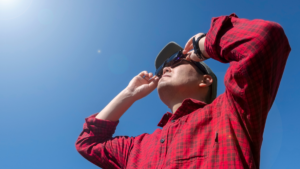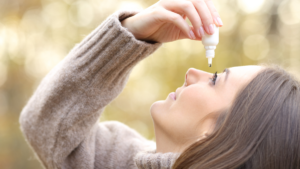Did you know that there will be an annular solar eclipse happening on October 14, 2023? That’s right, and most of Colorado will be able to witness up to 80% of obstruction! An annular solar eclipse is when the Moon does not completely cover the Sun and it will look like a dark disc with a bright reddish-orange ring around it. This is a wonderful opportunity to view a very rare event, but it must be done with caution. According to NASA¹ “viewing any part of the bright Sun through a camera lens, binoculars, or a telescope without a special-purpose solar filter secured over the front of the optics will instantly cause severe eye injury.” The sun is incredibly powerful and looking at it without protection will permanently damage the central vision in your eye.
The good news is that we’ve compiled a list of ways to safely view this rare occurrence! When in doubt consult an optometrist near you to help determine the best options for viewing the annular solar eclipse.
Some options to safely view the solar eclipse are²:
- Solar eclipse glasses
Use expert-approved solar “eclipse glasses” to view a solar eclipse safely and without damaging your eyes. You must wear your eye protection the entire time while watching a solar eclipse. - Pinhole projection
This is the safest and most inexpensive way to watch a solar eclipse. This helps you avoid looking directly at the eclipse by using a projected image. Learn how to make this DIY project here³! - Welder’s glass
You can find number 14 welder’s glass at your local welder’s supply or home improvement store. Welder’s glass will reduce the harmful rays that are emitted during the eclipse. - Mylar filters
Aluminized mylar plastic sheets are available as eclipse vision glasses or can be cut and made into a viewing box. Do not use if there are any scratches or damage to the sheet. - Additional options
You are always able to view the solar eclipse on TV or at a planetarium near you.
Now that you know the “Dos” for safely watching a solar eclipse, we’ll share the “Don’ts”.
Do NOT use:
- Smartphone
You might accidentally look at the sun when trying to line up the smartphone’s camera. This is dangerous for your eyes and the smartphone. - Camera viewfinder
Looking through the viewfinder of a camera is almost the same as looking directly at the sun with your own eyes. It is dangerous and can lead to eclipse blindness. - Unsafe filters
Unless specifically designed for viewing a solar eclipse, no filter is safe to use with any optical device (telescopes, binoculars, etc.). Using unspecified filters can increase your risk of damaging your eyes.With any of these methods, make sure that the products are not damaged, scratched or broken to ensure maximum eye protection. Also remember, if you wear corrective lenses, place the eclipse viewers over your glasses so you can see the natural event clearly and safely!
Solar eclipses are an exciting and rare event for most people to witness but be sure that you are properly prepared and protected when the time comes. For any more information on how to keep your eyes protected and healthy now or any other time of the year, reach out to an optometrist near you!

Kick Start Your New Year’s Resolution with Your Eye Health!
November 4, 2024
No Comments
Now is a great time to get a head start on your New Year’s resolution! What better way to care for your health than starting

Vision Awareness Patch Program
September 17, 2024
No Comments
Girl Scout leaders have you heard? There is now an eye health patch that your Girl Scout troop can earn! The Colorado Optometric Association and

Eye Health and Sport Safety
May 7, 2024
No Comments
Summer is nearly here, and kids are excited to go out and play! But with this we need to ensure that their eyes and vision

Are Your Eyes Ready for the Upcoming Total Solar Eclipse?
March 6, 2024
No Comments
A total solar eclipse¹ will cross the United States on April 4, 2024, passing over Texas, and traveling through Oklahoma, Arkansas, Missouri, Illinois, Kentucky, Indiana, Ohio,

The Time Has Come to Use Your Health Benefits!
November 6, 2023
No Comments
Have you made good use of your health benefits this year? If not, consider using your Health Savings Accounts (HSA) or Flexible Spending Accounts (FSA)

Winter is Coming – So Are Dry Eyes
October 5, 2023
No Comments
Brace yourselves, winter is coming and so are dry eyes! Winter weather conditions are one of the leading causes for dry eye symptoms. This is